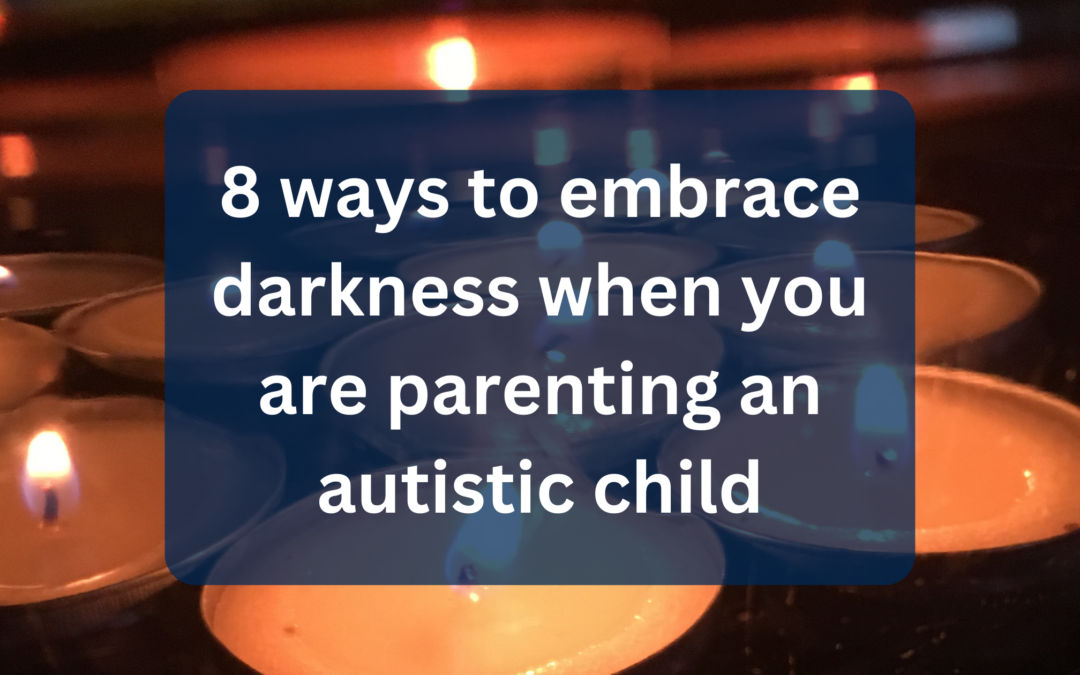When we are struggling in our everyday lives, the winter darkness seems to make this magnified. I experience being a parent of an autistic child as cycling through a sort of post-traumatic stress syndrome. Except, I am still going through things that are stressful. It comes and goes. Some days go easier than others. Darkness heightens our sense of hurt or struggle, but it also covers and enfolds it. In the pain and suffering times, when we are in the dark, we must stop and rest. For when we rest our weary souls, we will find that the little glimmers of light sparkle more brightly.
When we stop, we are freed to be a new version of ourselves. We are free to simply be. All the struggles and all the difficulties are not gone, but they are set aside for a short time.
In the dark, we need to look into our souls to find others in alignment with us. Sometimes the bright shining sun gives us a false sense of happiness. The smiles that we paste on even when we are in pain. When we are in the dark, we can’t see smiles but we can hear voices more clearly. How are you listening to your own voice and others?

If you are struggling with winter darkness or the darkness of difficult times, here are some tips that I have found to be helpful to me:
- Rest -When it is dark, we can more easily rest and go to sleep. So, don’t forget to take that chance to get more sleep than you normally do. Animals naturally do this (think of bears hibernating in winter). I found when I chose to rest more during the winter months because of an injury, that I don’t mind the darkness as much. It instead becomes a partner in the healing process. So, I have to remember to also rest proactively – so that I don’t get injured and sick so easily. Even if all the things you planned don’t get done, give yourself permission to find a way to get extra sleep.
- Pain Relief — when we take the chance to rest, it’s a natural form of pain relief. If we stop covering up our problems and instead tune in and listen to what they have to say, both physical and psychological problems can bring new insights.
- Don’t automatically take the painkillers (or try to take less)- In modern society, we have been trained to never stop and never take care of ourselves. Painkillers seem to be much more needed when you have to work hard and never get a break. And when we really explore and allow our emotions — physical pain can be lessened. Sometimes physical pain is a symptom of internal or emotional issues that we are not taking care of. So, make sure to find people to help you through. And don’t be afraid to let things release through singing or listening to music (see below).
- Cleaning — When you struggle with getting things done, take the pressure off yourself to innovate or strategize or check off something on your work to-do list. (Obviously, if you are injured physically, then maybe getting others to help with cleaning will be better.) But, if you are feeling physically up for it, but emotionally struggling this is a good time to clean. Take a little time to simply declutter and clean your space. It seems counterintuitive when we are stressed and feeling pressured to get everything done on a certain timeline. But, sometimes stopping to organize and clean, helps clear our emotional space and makes us feel good about something we accomplished. I also find my child is calmer when things are a bit more organized (even though they like to make a giant creative mess at other times).
- Humming and singing can allow for the release of our emotions and can also calm us down. A self-created sound is also a powerful form of pain relief, so the next time you are struggling in the darkness or in pain, take time to create music.
- Candles — there is subtle, calm energy about lighting candles or lighting a fire in the fireplace and being cozy. The candlelight has a calming effect and can bring us more in tune with nature. I find in the winter darkness, I pay more attention to my eating and to the people at the table when we light candles at dinner time. It also gives me a feeling that we should be quieter and have calm conversations while eating. Making sure your child isn’t drawn to playing with light, can bring a nice quiet setting to the mealtime.
- Appreciate the light- When you have moments of new energy and inspiration from others that bring light into your situation, appreciate and celebrate this.
- Nature- when you can’t socialize with others, take time to socialize with the trees and the animals outside. Notice what birds and trees can be visible from your window. Take time with your eyes to follow the squirrel as it runs around your yard or the birds as they light on your trees. Take walks outside. Breathe in the fresh air and get outside in the sunlight when the sun is up. The squirrel or bird in your yard is not caught up in the social norms and expectations that the world of people is. This can be easier for you and your child to relate to when things are stressful.
Share with me your tips for getting through the darkness and difficult moments of life. When we come together in community, we all rise.


